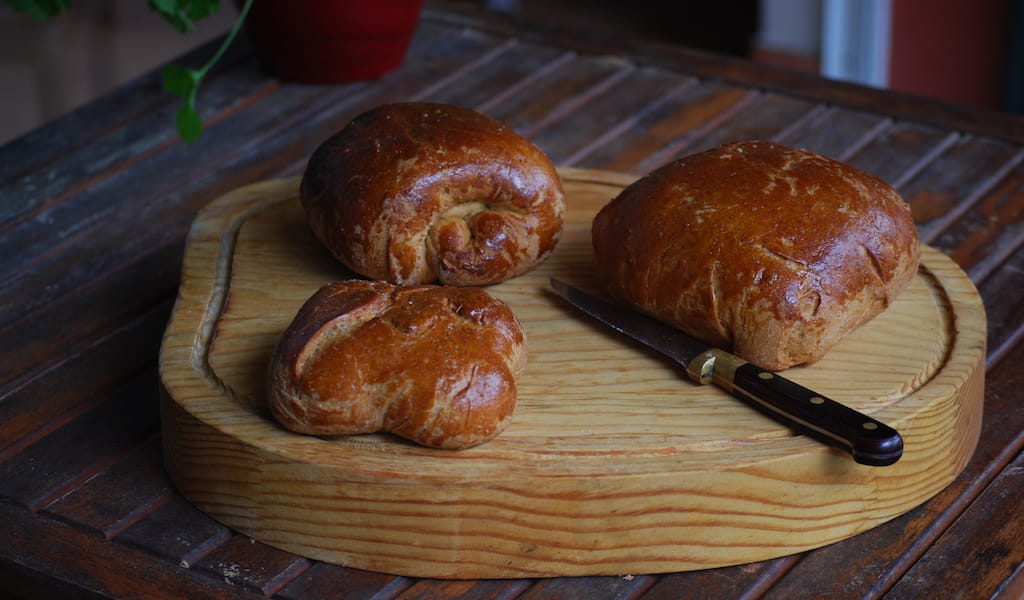One of the things we cherish most at Culinary Backstreets are the friendships we build with the restaurant and small business owners featured on our walks. While we worry what will happen to them (and their independent businesses) once the pandemic ends, we also want to learn more about what they are doing during this period.
The first person we checked in with was chef Filipe Rodrigues, from Taberna do Mar. He hasn’t left home since he closed the small corner restaurant, one of the highlights of our Lisbon walk “Hidden Flavors of the Hillside: Graça and Mouraria,” on March 14. While the delicious fish dishes are always a big hit with our guests, they really seem to love chatting to Filipe and admiring his skills, especially when he torches the sardine nigiri.
These days, daily life is quite different from busy evenings in the restaurant. Now, he spends most of his free time outside, in his backyard; instead of a torch, he handles a hoe. He dedicates most of his day to growing vegetables and fruits with the help of his two sons aged 6 and 9. “It’s almost like it is the weekend every day with everyone at home,” says Filipe, talking to us on the phone from his home in Almada, on the south bank of Lisbon.

In the morning the children study and do homework, and in the afternoon they are outside tending to the garden, which is planted with lettuce, parsley, coriander and other herbs, cabbages, leeks, tomatoes, onions, broccoli, peppers, spinach, strawberries, potatoes, zucchini and more.
Some of the vegetables were planted recently but some were already in full bloom when the coronavirus shut down everything. The spring plants and vegetables are at their peak, and the blessed rain a few weeks ago made everything grow faster. “My kids like to help, we’re doing this a bit like playing after lunch, spending most of the afternoon outside and it’s a fun activity for everyone,” explains the chef, whose daily routine now looks more like that of a full-time farmer. He highly recommends gardening through the lockdown: “Anyone can try to grow [plants] on a balcony, some herbs for example.”
Filipe’s wife is working from home and is in charge of doing all the shopping as he has to avoid public places for now due to his bronchitis. Most of the family’s meals consist of comfort food: comida de tacho (pot stews), rice and pasta dishes, grilled fish, and even pizza, the dough for which Filipe makes from scratch (with Taberna do Mar’s sourdough starter). Or even fava beans with blood sausage paired with a lettuce salad from the garden (there 39 heads of lettuce currently growing, his son adds). They try to make lunch their big meal, going for a lighter dinner of soup and fruit, or something along those lines.
The uncertain future worries Filipe and his business partner Hugo. They are following the news and will probably ask for help from the government rescue program, which includes rent suspension. But Filipe is worried about the post-pandemic life, if people will be able to afford to go out for dinner or to travel to Portugal from other countries.

The truth is that like so many others we are missing Taberna’s wonderful fish creations and its delicious sourdough bread. So we asked his advice to bake some at home. His starter was originally made almost two years ago with organic flour and water and a bit of organic apple from his garden. “It took two or three days to work and then we started to make tests, after two-three weeks we could bake bread, and since then we have been feeding it – adding water and flour at the restaurant,” he tells us.
To replicate this at home, Filipe suggests using good flour – he sources his from Paulino Horta in Alenquer, north of Lisbon – and spring water if possible. “Just leave it at room temperature for two or three days. After that, when it gets the texture of a crepe dough and it’s bubbling, it’s ready to start feeding daily, adding a bit of water and a bit of flour and wait two or three weeks [before baking with it],” he says.
If baking bread with 500 g of flour, he recommends using around 150 g of starter diluted in tepid water – ideally the fermentation will be 24 hours before going into the oven. With home ovens it works better inside a Dutch oven (a lidded cast iron pot).
Filipe admits he doesn’t have much free time with all the domestic and garden work, as well as the recycling and composting, but he keeps up with his trade friends and colleagues online, discussing the tough situation or watching workshops. But, really, he can’t wait to get back to his restaurant – and we can’t either.
 April 2, 2024 Grandma’s Folar Recipe
April 2, 2024 Grandma’s Folar Recipe
Folar is the generic name given to traditional Easter sweet bread in Portugal. Making it […] Posted in Lisbon April 30, 2021 La Cuisine de Gagny
April 30, 2021 La Cuisine de Gagny
In Marseille, dining out in the Covid era has often meant eating in. Pizza, kebabs and […] Posted in Marseille March 5, 2021 Contracorrent Bar
March 5, 2021 Contracorrent Bar
It takes bravery and strength to swim against the flow, traits the Catalan sommelier […] Posted in Barcelona
Published on April 21, 2020
Related stories
April 2, 2024
LisbonFolar is the generic name given to traditional Easter sweet bread in Portugal. Making it from scratch is somewhat of a long process, but being confined due to the coronavirus crisis, we seem to have a bit more time on our hands than expected. My family’s folar recipe is from my grandmother Felismina, who was…
April 30, 2021
MarseilleIn Marseille, dining out in the Covid era has often meant eating in. Pizza, kebabs and other fast food have triumphed over cooked dishes, since they can more easily withstand travel in cardboard containers. While many restaurants have either pivoted to portable sandwiches or tried to implement new packing methods (like soupe à l’oignon in…
March 5, 2021
BarcelonaIt takes bravery and strength to swim against the flow, traits the Catalan sommelier Anna Pla and her partner, the Sicilian chef Nicola Drago, certainly do not lack. The duo opened Contracorrent (“Against the flow” in Catalan) Bar, a natural wine bar and restaurant, in November 2020, amidst a series of pandemic-induced openings and closings.…


















































































